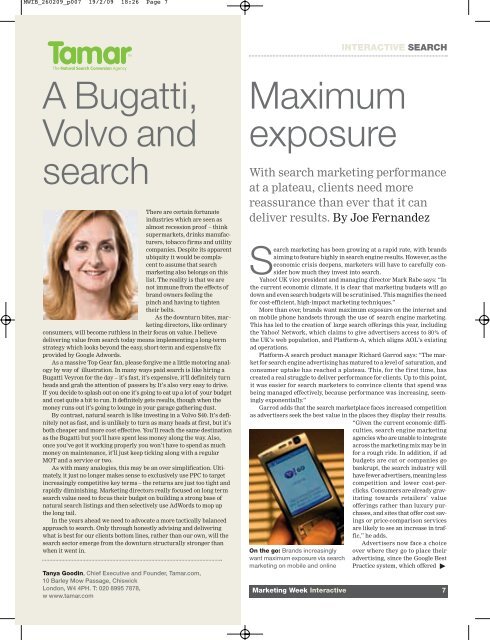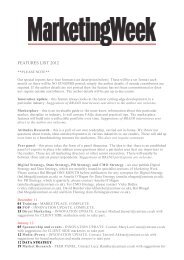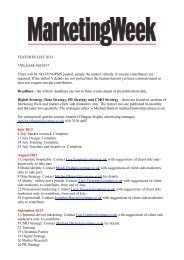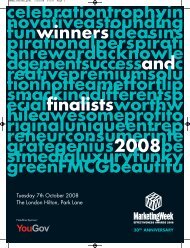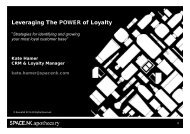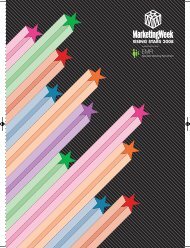Interactive Seven 2009 Supplement - Marketing Week
Interactive Seven 2009 Supplement - Marketing Week
Interactive Seven 2009 Supplement - Marketing Week
Create successful ePaper yourself
Turn your PDF publications into a flip-book with our unique Google optimized e-Paper software.
MWIB_260209_p007 19/2/09 18:26 Page 7<br />
INTERACTIVE SEARCH<br />
A Bugatti,<br />
Volvo and<br />
search<br />
There are certain fortunate<br />
industries which are seen as<br />
almost recession proof – think<br />
supermarkets, drinks manufacturers,<br />
tobacco firms and utility<br />
companies. Despite its apparent<br />
ubiquity it would be complacent<br />
to assume that search<br />
marketing also belongs on this<br />
list. The reality is that we are<br />
not immune from the effects of<br />
brand owners feeling the<br />
pinch and having to tighten<br />
their belts.<br />
As the downturn bites, mar -<br />
keting directors, like ordinary<br />
consumers, will become ruthless in their focus on value. I believe<br />
delivering value from search today means implementing a long-term<br />
strategy which looks beyond the easy, short-term and expensive fix<br />
provided by Google Adwords.<br />
As a massive Top Gear fan, please forgive me a little motoring analogy<br />
by way of illustration. In many ways paid search is like hiring a<br />
Bugatti Veyron for the day – it’s fast, it’s expensive, it’ll definitely turn<br />
heads and grab the attention of passers by. It’s also very easy to drive.<br />
If you decide to splash out on one it’s going to eat up a lot of your budget<br />
and cost quite a bit to run. It definitely gets results, though when the<br />
money runs out it’s going to lounge in your garage gathering dust.<br />
By contrast, natural search is like investing in a Volvo S40. It’s definitely<br />
not as fast, and is unlikely to turn as many heads at first, but it’s<br />
both cheaper and more cost effective. You’ll reach the same destination<br />
as the Bugatti but you’ll have spent less money along the way. Also,<br />
once you’ve got it working properly you won’t have to spend as much<br />
money on maintenance, it’ll just keep ticking along with a regular<br />
MOT and a service or two.<br />
As with many analogies, this may be an over simplification. Ultimately,<br />
it just no longer makes sense to exclusively use PPC to target<br />
increasingly competitive key terms – the returns are just too tight and<br />
rapidly diminishing. <strong>Marketing</strong> directors really focused on long term<br />
search value need to focus their budget on building a strong base of<br />
natural search listings and then selectively use AdWords to mop up<br />
the long tail.<br />
In the years ahead we need to advocate a more tactically balanced<br />
approach to search. Only through honestly advising and delivering<br />
what is best for our clients bottom lines, rather than our own, will the<br />
search sector emerge from the downturn structurally stronger than<br />
when it went in.<br />
Tanya Goodin, Chief Executive and Founder, Tamar.com,<br />
10 Barley Mow Passage, Chiswick<br />
London, W4 4PH. T: 020 8995 7878,<br />
w www.tamar.com<br />
Maximum<br />
exposure<br />
With search marketing performance<br />
at a plateau, clients need more<br />
reassurance than ever that it can<br />
deliver results. By Joe Fernandez<br />
Search marketing has been growing at a rapid rate, with brands<br />
aiming to feature highly in search engine results. However, as the<br />
economic crisis deepens, marketers will have to carefully consider<br />
how much they invest into search.<br />
Yahoo! UK vice president and managing director Mark Rabe says: “In<br />
the current economic climate, it is clear that marketing budgets will go<br />
down and even search budgets will be scrutinised. This magnifies the need<br />
for cost-efficient, high-impact marketing techniques.”<br />
More than ever, brands want maximum exposure on the internet and<br />
on mobile phone handsets through the use of search engine marketing.<br />
This has led to the creation of large search offerings this year, including<br />
the Yahoo! Network, which claims to give advertisers access to 80% of<br />
the UK’s web population, and Platform-A, which aligns AOL’s existing<br />
ad operations.<br />
Platform-A search product manager Richard Garrod says: “The market<br />
for search engine advertising has matured to a level of saturation, and<br />
consumer uptake has reached a plateau. This, for the first time, has<br />
created a real struggle to deliver performance for clients. Up to this point,<br />
it was easier for search marketers to convince clients that spend was<br />
being managed effectively, because performance was increasing, seemingly<br />
exponentially.”<br />
Garrod adds that the search marketplace faces increased competition<br />
as advertisers seek the best value in the places they display their results.<br />
“Given the current economic difficulties,<br />
search engine marketing<br />
agencies who are unable to integrate<br />
across the marketing mix may be in<br />
for a rough ride. In addition, if ad<br />
budgets are cut or companies go<br />
bankrupt, the search industry will<br />
have fewer advertisers, meaning less<br />
competition and lower cost-perclicks.<br />
Consumers are already gravitating<br />
towards retailers’ value<br />
offerings rather than luxury purchases,<br />
and sites that offer cost savings<br />
or price-comparison services<br />
are likely to see an increase in traffic,”<br />
he adds.<br />
Advertisers now face a choice<br />
On the go: Brands increasingly over where they go to place their<br />
want maximum exposure via search advertising, since the Google Best<br />
marketing on mobile and online Practice system, which offered <br />
<strong>Marketing</strong> <strong>Week</strong> <strong>Interactive</strong> 7


